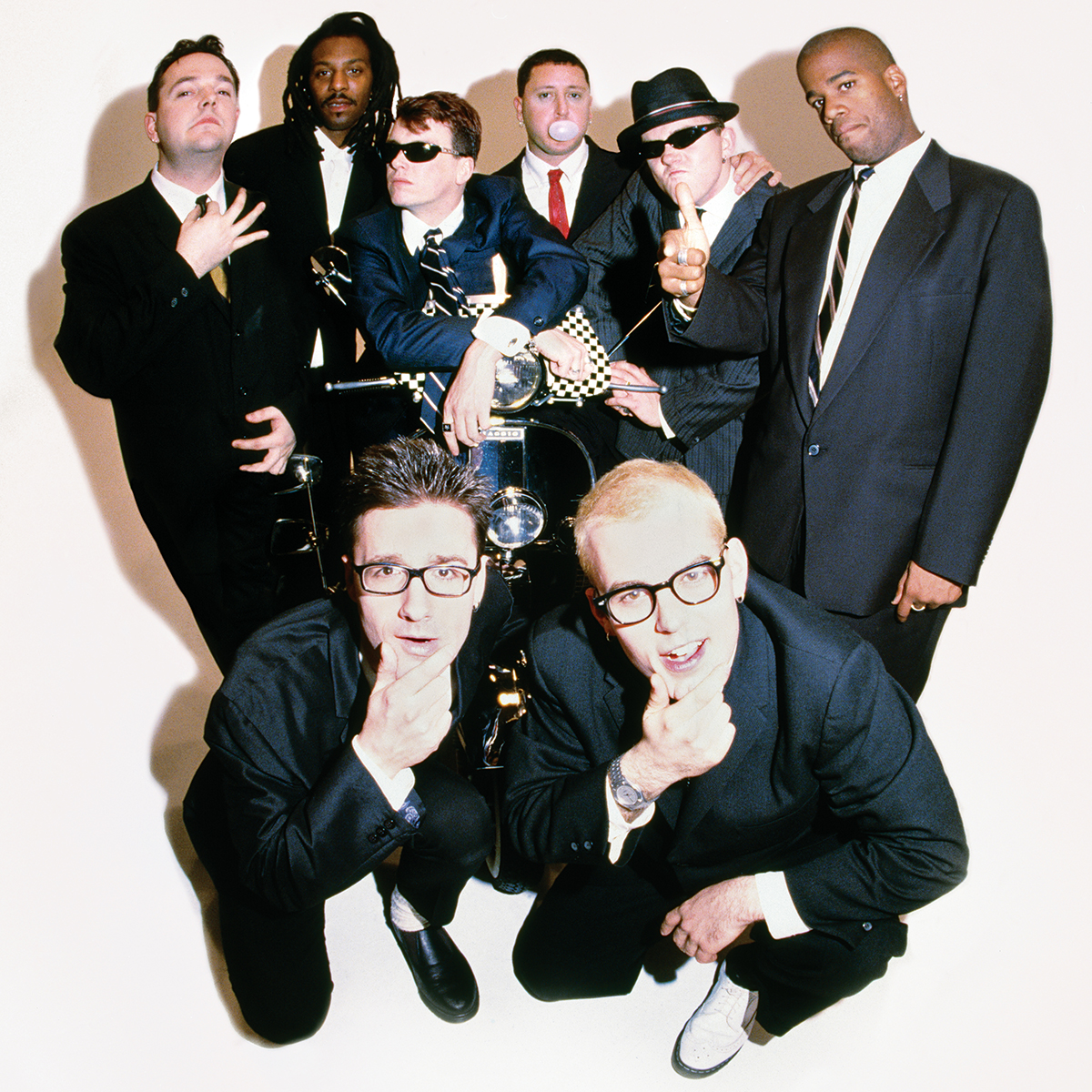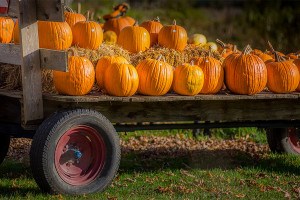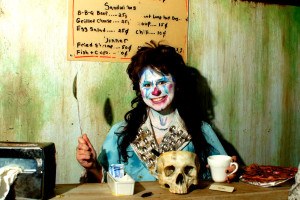Home Is Where the Bosstones Are

In 1997, the Mighty Mighty Bosstones went mainstream with hit song “The Impression That I Get.” / Photograph by BJ Papas
This may seem like an irreconcilable contradiction, but I don’t think it is, because I’ve always felt exactly the same way. Even in my early twenties, I’d devolve into a WWII veteran visiting Omaha Beach whenever I walked by where the Tasty used to be. Maybe it’s the fact that Boston has always been equally defined by old and young, and the two halves have never really found common ground. Or maybe it’s the vestigial fun-hating Puritanism, or the weather, which at the right time of year can turn the most cheerful soul into a miserable prick in about 18 seconds.
Who can say? But that dynamic—the strain between youth and age—has driven a lot of the Bosstones’ best work. Barrett has written his share of songs about drunken mayhem (“Drunks and children, they tell you the truth / That’s what I am: I’m drunken youth”), and once passed out —not at the bar, but on the bar —at the Rat. Still, in “Almost Anything Goes,” a song about New York, he sounds like someone’s grandmother: “I wanna wake up in a city / that likes to go to bed / where they know what time of day it is / But I’m stuck here instead.”
During my call with Barrett, I asked him how old he is.
“I’m 51 years old,” he said. “But I’ve been 51 since I was 17.”
“I feel exactly the same way,” I told him. “Why do you think that is?”
“It’s fucking ’cuz of Boston!”
I’m ashamed to admit it, but there’s something else, too. It’s about feelings. I know, I know. I’ll be brief. I’m not going to say the Bosstones taught me how to feel. But they were able to express feeling in a way that made it okay, in a way that wouldn’t turn off Bostonians. This is no mean achievement. I once heard from an Arkansan—they’re a people not exactly known for full and immediate emotional disclosure—that Bostonians are “emotionally constipated.” I told her that’s absolutely true. And it makes our jokes funnier. But, yeah, in retrospect, it makes other things harder.
The Bosstones to this day are known as a rowdy, good-time band, but much of their work is actually intensely melancholic. It’s about lost love and insecurity, and nostalgia and neurosis and people going away and sometimes even coming back. A lot of music is like this, of course, but the Bosstones are able to get these feelings across in a way that is palatable to the local sensibility. It may be melancholy, but it’s loud and fun, meaning you can vent both anger and sorrow while listening to it, or, back in the day, moshing to it. Barrett years ago called it “an aggressive-love thing.” I’ve always seen it as the equivalent of the very Bostonian habit of expressing affection through insults and horseplay.
I asked Barrett if he thought this rare emotional catharsis was part of the reason why the Bosstones are so beloved in the Hub, but we both struggled to express what it is and why it’s happening and why it’s so important. Finally, he cut me off. “You can even tell by the way we’re talking about this—we’re both stammering. We have to move on,” he said. “We’re from Boston.”
After I got off the phone with Barrett—who, by the way, still has a 617 in his cell number and a 33 in his email address—I got in touch with a friend who grew up in Newton, another longtime Bosstones fan who has since left the area. We started talking about why the band still has such a hold, even though they’re at best part-time these days, and few of the members actually live in Boston anymore.
My friend offered a theory: The ’90s were kind of a low point for Boston—the sports teams sucked, the economy was soft—and the Bosstones were primed to fill that void. “I didn’t know dick about music,” my friend said. “But I knew the Bosstones, because they were Boston.” And when they blew up, he loved it, because “it was proof to the world that Boston mattered. A Bostonian doing well was like a ‘fuck you’ to the rest of the world,” he said, adding, “Nothing is more Bostonian.”
It’s true. In terms of influence, history, and now prosperity, Boston is a first-class city. But it often behaves like a second-class city, an underdog, Cleveland of the Northeast.
Sports, not art, is the best framework within which to understand Boston. And the Bosstones, like Dropkick Murphys, always behaved as much like a sports team as they did a band. They reflected the city, acted as its public face in a way. And the sports connection can be literal: Bosstones records frequently name-check the Sox. Barrett sang the national anthem at the first Pats game at Gillette Stadium. They debuted a video on opening day at Fenway; they played there with the Dropkicks, and with Foo Fighters. They even had a song called “Wasted Summers” that for a while I thought was about a really bitter breakup, until I realized it was actually about Johnny Damon.
In 2000, Barrett himself drew the parallel, telling the Herald, “I think the Red Sox are to baseball what the Bosstones are to rock ’n’ roll.” The Herald writer interpreted that as meaning, “Nice guys who do a bang-up job,” and that was probably what Barrett meant. But looking back from the vantage of 2016, I think there’s more happening there. Yes, they’re good guys working hard. The Bosstones, like the Sox of the aughts, were “a little bit ugly,” to borrow a line from Barrett. They were scrappers, muckers, characters, and they went a very long time before they hit it big.
And then they won. Both of them. The Bosstones in 1997. The Sox in 2004.
And then what?
I remember sitting at the Cellar in Central Square the night the Sox won the Series in 2004. We went crazy. People were hugging, screaming, the better part of a century’s worth of frustration was being vented, for us, for our parents, grandparents. And amid all this clamor, my oldest friend turned to me, and said, “What the fuck do we do now?” I was never able to answer that question, but I noticed right away that something important had been lost along with the something that had been won.
After More Noise hit the stores in 1992, I bought every other Bosstones album the day it came out. I lived with, in, and through them. I rejoiced when Question the Answers came out because it had a Boston Police car on the cover, and that made it more mine than something that didn’t have a Boston Police car on the cover. I got my hands on a review copy of Let’s Face It weeks before the release, at a used-record store in Pennsylvania when I was in college. The range of my musical taste had expanded exponentially by then, but I still listened to the Bosstones constantly; I still studied the album art of each release to try to divine how these sorts of sounds could come from these sorts of guys; I still wore the T-shirts; I still felt that catharsis.
But when they hit it big in 1997, I’m ashamed to admit, I strayed. This is not an uncommon thing in music-snob circles, to believe a thing to be diminished because other people like it, too. It’s not flattering, and I’m not proud of it, but Bostonians are gifted begrudgers, and I am a Bostonian. Plus, I didn’t love the hit. I suspect the band felt the same way, at least after playing it ad nauseam. In 1998’s exceptionally rowdy Live at the Middle East, Barrett introduced it by saying, “I think we know this fucking song,” and the crowd, which up until then had been going henshit, offered up a golf clap.
At least I discovered that years later, because I didn’t buy Live at the Middle East. I did buy the follow-up, Pay Attention, but didn’t heed the title. Nor did mainstream record buyers. Pop music had moved on from its fling with ska music (No Doubt, Sublime, et al.). The Bosstones left their major label and returned to the indie world. They released A Jackknife to a Swan. I didn’t buy it, though if I had, I would have heard Barrett raging against the dying of old Boston in “I Want My City Back,” sounding a lot like I did then.
Up around 95, sailing down Storrow Drive
Left exit into Kenmore Square
Slowed down when I got there
And that’s when it was crystal clear
It wasn’t there, it wasn’t where
I left it, when I left it
I want my city back
Back the way it used to be
I want it back the way it was
By then, the “they” of “They Came to Boston” had come in force, and they had taken it, sure as Napoleon took Vienna. The Bosstones, maybe the firmest link we had to the old town fast receding in the rearview mirror, broke up in 2003. When it happened, I’m ashamed to say, I didn’t even know. I moved away to New York City a few years later. And here I am now, sitting in an apartment in New York, obsessing over them anew, and wondering why.
Of course, they came back. After a four-year hiatus, the Bosstones played their 10th Hometown Throwdown—the annual run of famously rambunctious and immediately sold-out shows that takes place in December—in 2007. They still do them—this year’s, the 19th, will run December 28, 29, and 30 at the House of Blues. Then the machine lurched back into motion. They released three more records. I bought two of them initially, Medium Rare, a collection of B-sides that functioned as a sort of comeback record, and The Magic of Youth, a proper album.
The later stuff is strong. It has a poignant happiness to it, a relief at being together again (even though there have been some personnel changes), without the pressure to move units or the exhaustion from life on the road. Nothing feels taken for granted. But there’s one song that has stayed with me since I first heard it: “Don’t Worry Desmond Dekker.” Named for the ska pioneer, it’s the only recent Bosstones song I can say I listened to obsessively. It initially struck me because, of course, there’s a reference to Boston in it. Hemenway Street. But there’s more to it. It’s a love song, a really beautiful one, and a song of reconciliation.


